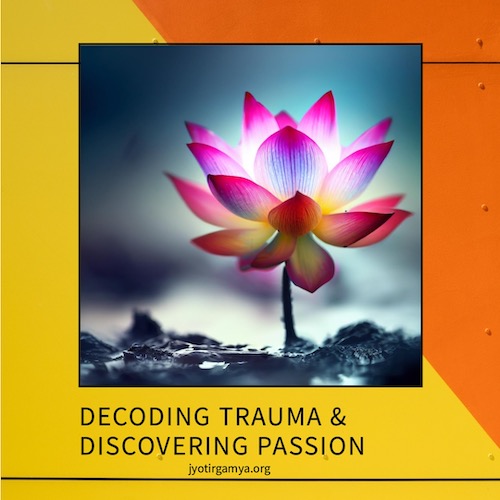Decoding Trauma & Discovering Passion: Interview with Clinical Psychologist
In her demureness, a young lady approached a psychology teacher to seek answers to some questions. The questions would range from “How do people approach each other?”, “How do you convey to someone - I like you?” She would remain puzzled about interpersonal communication topics.

The teacher shared case studies with her to satiate her curiosity and confusion. She gradually became interested in the topic; the universe inside people’s minds piqued her interest, which is how the journey started for Tanusree.
Tanusree has over 11 years of experience in Clinical Psychology, where she currently offers Neuroscience based Trauma-informed, queer, and neurodiversity-affirmed psychotherapy for people of all ages. One of her unique offerings is helping people discover their true selves.
This interview discusses Trauma, observational self, Passion, and Seeking the True Self.

What is Trauma?
Trauma is an emotional response to a highly stressful event. Traumatic events are sudden and unpredictable, posing a severe threat to one’s existence. These events usually feel beyond a person’s control, leaving the individual disconnected, overwhelmed, or numb. Trauma is dependent on perspective and individual interpretation. One person’s everyday experience can very well be another person’s trauma.
Types of traumatic events
Traumatic events include physical or sexual abuse, natural disasters, serious accidents, witnessing violence, experiencing war or combat, or being involved in life-threatening situations. It is essential to recognize that the perception of trauma is subjective, and what may be traumatic for one person may not be the same for another. Understanding the diversity of traumatic events helps validate individuals' experiences and promotes empathy and support in their healing journey.
How does the brain process Trauma?
Neuroscience tells us that Trauma can change the brain structure. Trauma is the impact of a highly unpleasant event. The impact changes the structures in the brain.
These changes are not merely psychological but also physiological, meaning that the neurological structures of the brain may be impacted.
The parts of the brain are affected by the stress response, which is mainly seen in the amygdala, hippocampus, and prefrontal cortex. Traumatic stress can be associated with lasting changes in these brain areas.
Can we erase Traumatic memories?
No. Memories are not erased but processed. After the trauma is resolved, the memory does not go away. One may aim through therapy to be able to look at the memory someday without a deep sense of pain.
When Trauma happens, the emotions are not fully processed, and memory formation is hampered. When Trauma is healed, they can remember the incident, but it won’t generate severe emotional pain or suffering.
Memories are made of sensations and interpretations. The brain does not erase but either suppresses or represses the footprints. Once you see trauma, you can’t unsee it.
When should someone approach a Trauma Specialist?
When someone frequently feels emotionally dysregulated. For ease of understanding, we can say that if one constantly finds it challenging to stay in the present. If one keeps worrying about the past or brooding over problems in the future without enough reason in current reality, that is when one might try trauma-focused psychotherapy.
For instance, a case of repeated anger outbursts without any sufficient provocation could be a symptom. Going to a counselor might need more help. One should approach a Trauma Specialist.
Techniques and Approaches in trauma-focused Psychotherapy
Trauma-focused psychotherapy employs various evidence-based techniques to help individuals process and heal from traumatic experiences. Cognitive-behavioral therapy (CBT) focuses on identifying and challenging negative thought patterns and behaviors associated with trauma. Eye Movement Desensitization and Reprocessing (EMDR) is another practical approach that combines elements of exposure therapy with bilateral eye movements or other forms of stimulation to facilitate the processing of traumatic memories. These techniques, along with others like trauma narrative work, grounding exercises, and relaxation techniques, are tailored to the unique needs of each individual and play a crucial role in trauma recovery.
Can someone personally deal with Trauma?
You could build a house on your own. But will you be able to do all of it on your own? Time, effort, and management-wise, will it be a prudent decision? You need operational expertise and experience.
Healing on your own takes longer and makes you prone to worsening symptoms. Why?
Because when learning, their chances of mistakes are, and the outcome is emotional overwhelm. This might cause permanent damage.
Some might be able to handle the overwhelm; some might not be. Just like one can cure flu without medication, trauma can also be healed without therapy, albeit it will take longer, and one needs to consider the risk of such a path.
The first step for healing trauma would be to learn to be mindful of your thoughts and emotions.
How can someone be mindful of thoughts and emotions?
Question frequently - What am I feeling? Why am I feeling? Where in the body am I feeling things? Pay attention to the sensation, the emotion. See if you can do something to regulate the emotional outburst. Learn how to do so.
Awareness of the breath, body, emotions, and thoughts is essential. There is no point in sleepwalking through life. Be aware and open about the self for the whole experience. Try mini-awareness sessions lasting 20 - 30 seconds. Do it multiple times daily, and be aware of your breath, body, thoughts, feelings, and emotions.
Living a mindful life is generic advice but not for people with severe problems; only a specialist can help.
Why should we bother to be mindful of emotions and thoughts?
You want to be the cog in the wheel or the driver? Instead of wondering why things are happening to you, if you try to understand your environment and your response mechanism and way of being, you do not let things happen to you, but you are taking charge of the situation.
You are not merely a victim; instead, you are a person affected by trauma and learning to heal. Half the time, we don’t even know what we are feeling. Just observing the emotion reduces its impact. You are not at the mercy of your emotions, but you own and manage your emotions. You do not just react but mindfully respond after having analyzed a situation.
Benefits of Mindfulness in trauma healing
Practicing mindfulness can be highly beneficial in trauma healing. By cultivating present-moment awareness, individuals can better understand their thoughts, emotions, and bodily sensations. Mindfulness helps regulate overwhelming emotions, reduces stress, and promotes self-compassion. It allows individuals to approach their traumatic memories with curiosity and non-judgment, facilitating the processing and integrating of those experiences. Additionally, mindfulness practices provide individuals with valuable tools to stay grounded, manage triggers, and cultivate resilience throughout their healing journey.
How should one go about developing the “observing self”?
This is a matter of being rather than doing. We have all these different selves present within us. Watching yourself. Noticing how you respond and interact. This allows you a pause.
One self engaged in the situation, the other intently observing you being engaged with the world. It all can begin with asking simple questions: What do you like to do? What’s your favorite color? What is your favorite food? What are the most predominant emotions? And gradually, once you start seeking more, you start discovering more.
Passion has become a buzzword and is often loosely used. Tell us, is it important at all to have any passion at all?
Passion translates into an engagement. If you talk to someone passionate about something, it would be an in-depth and specific topic. If one doesn’t have passion, one’s life will lack salt. Life becomes much more meaningful with the presence of passion.
How do you go about figuring out what you are passionate about?
Passion demands total immersion. Having an interest and having a passion are different. One might be good at several things. One can have several interests that can be pursued. Not necessarily all of it will translate into passion.
Give yourself opportunities. If every month your passion changes, it is a sign of a fickle mind. Explore various opportunities and pick those which stick. I could be passionate about 2 - 3 things, but they will stay. I also have to give enough opportunities to our interests. What sticks amongst those interests is passion. Persistent interest is your passion.
Should one go about finding his purpose or a mission statement?
One should not go about finding a mission statement. Be passionate. Explore a lot. Try to see lives through different perspectives. Your job is to observe. The world is vast. There are many choices. Discover it for yourself. The answer is not outside. It does not come as an answer in a guidebook. The answer will reveal itself if you are ready to go through all good and bad experiences.
Specific examples of how people can explore their interests
- Explore your interests and passions: If you’re interested in art, try taking a painting class or visiting a museum. If you’re interested in music, try learning to play an instrument or going to a concert. If you’re interested in writing, start a journal or blog.
- Connect with your inner self: Try meditating, journaling, or spending time in nature. You could also talk to a therapist or counselor.
- Set goals for yourself: What do you want to achieve? What are your short-term and long-term goals? Once you know what you want to achieve, you can start to make a plan to get there.
- Take risks: What are you afraid of? What are you holding yourself back from? Once you identify your fears, you can start to take small steps to overcome them.
Finding your true self is a journey, not a destination. It takes time, effort, and self-reflection. But it is a journey that is well worth taking.
Conclusion
Trauma is a profoundly impactful emotional response to a highly stressful event, and its effects can alter the brain’s psychological and physiological structures. While traumatic memories cannot be erased, therapy can help individuals process and heal from trauma, allowing them to remember the events without experiencing severe emotional pain.
Recognizing the need for professional help is crucial when experiencing emotional dysregulation or persistent difficulties in staying present, as trauma-focused psychotherapy can provide adequate support.
Furthermore, fostering mindfulness of thoughts and emotions is essential in healing. Individuals can regain control over their lives by being aware of their inner experiences and actively managing emotions.
Developing an “observing self” through self-reflection and introspection allows for a deeper understanding of one’s preferences, emotions, and interactions with the world.
In light of these findings, it is evident that addressing and healing from trauma, cultivating mindfulness, and pursuing one’s passions are interconnected and vital aspects of personal growth and well-being. It is essential to seek professional help and embark on a self-discovery journey with openness, curiosity, and resilience. By doing so, individuals can unlock their true potential, find fulfillment, and lead more meaningful lives.
Related Articles
Urge to Control is the Mother of Anxiety
Want to stay connected? Here’s our twitter.